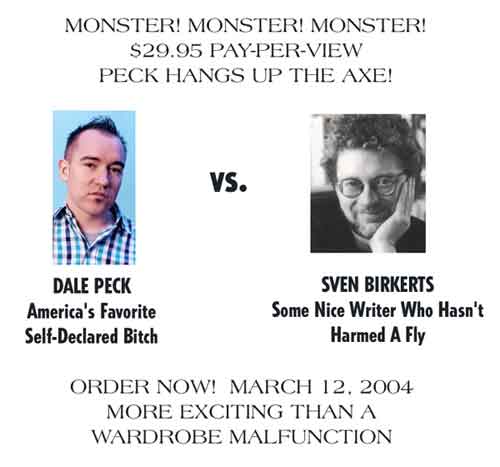The Hollywood Reporter (of all places) is reporting that John Updike has won the PEN/Faulkner.
[UPDATE: Here’s the Reuters article. Damn, I was rooting for ZZ. I dig the Rabbit Angstrom books, but does Updike need another award?]
The Hollywood Reporter (of all places) is reporting that John Updike has won the PEN/Faulkner.
[UPDATE: Here’s the Reuters article. Damn, I was rooting for ZZ. I dig the Rabbit Angstrom books, but does Updike need another award?]
The Times chronicles the success story of Andrew Sean Greer, now covered in every newspaper from here to Madrid. Read Max Tivoli before you get sickened by the chronic coverage.
Beyond that, there’s stunning news of Anne Fadiman departing The American Scholar. Fadiman was reportedly asked to leave because of PBK’s perilous finances. Under Fadiman’s tenure, the Scholar was one of the foremost places to find nonfiction.
Rake points to this press release for “Peck’s Last Negative Review Ever.” There’s a phone number there for some guy named Peter McFarlane, if anyone’s curious. McFarlane notes that he “scored” the Peck review. Well, certainly, if anyone wishes to compare acquiring an essay called “The Man Who Would Be Sven” to a midnight run for a dime bag, then the metaphor is apt. We here at Return of the Reluctant, however, prefer publicity in a more abrasive form:

Sykes, a 34-year-old contributing editor at Vogue and the more dramatic sister of a nineties ?It?-girl twin set??Lucy and I were Paris and Nicky without the sex tape??received a $625,000 advance for her novel from Miramax Books in 2002. Bergdorf Blondes turns out to be a Devil Wears Prada where everyone is an angel. ?I say, if you are lucky enough to go on gorgeous trips abroad, take your girlfriends something fashionable back,? reads one line. Early reviews are lukewarm (?Tacky? Absolutely,? said Publishers Weekly).
(via Emma)
You’ve sold more than 40 million books. Number 12’s about to come out. What do you do to keep your readers hooked? You throw in the Messiah himself.
Yes, Glorious Appearing, the latest entry in the Left Behind series is almost due. And this time, it’s personal. Jesus himself shows up. And for those who can’t wait for the Literary Event of the Millennium, there’s an excerpt up for die-hards:
Mac’s magnified vision fell upon colorful, metallic pieces glinting in the sun, perhaps a mile from his position. Oh no.
A red fuel tank and a tire looked very much like parts from Rayford’s all-terrain vehicle. Mac tried to steady his hands as he panned in a wide arc, looking for signs of his friend. It appeared the ATV could have been hit by a heat-seeking missile or smashed to bits by tumbling. Perhaps, he thought, no sign of Rayford nearby was good news.
Quite possibly, the prose could have been wrought by a devout illiterate or ignored to bits by sleeping.
Dr. LaHaye also notes, “The Bible clearly teaches there’s going to be a one-world government in the last days. And after the Rapture of the church, then that one-world government will coalesce, bringing together all the governments of the world and also bringing together all the religions of the world. The fact that we’re seeing some of those things happen right now must be a wake-up call to some people to say, `Hey, we may be closer than we think.’ ”
I don’t know, Doc. I’d go with the unnecessary revival of Kirk Cameron’s career as augury.